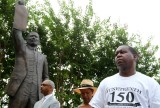The Ghetto’s Complex and Troubled Legacy
Ghetto: The Invention of a Place, the History of an Idea
In 2017, we often hear the word “ghetto” come up in music lyrics and casual conversation, out of the mouths of politicians and activists. We know what it means; it needs no explanation. Yet beyond its negative connotations lie 500 years of rich—and relevant—history. Princeton University sociologist Mitchell Duneier, winner of the seventh annual Zócalo Book Prize for Ghetto: The Invention of a Place, the History of an Idea, visits Zócalo to examine why the ghetto endures and what it means to us today. Below is the preface from his …










